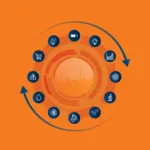A leading initiative by Jungbunzlauer Austria AG.
Jungbunzlauer Austria AG has implemented large-scale heat pumps to harness excess heat from production processes, significantly reducing the use of process steam. This innovative approach has led to a remarkable annual reduction of 35,000 tonnes of CO2e emissions.
With its core competency in fermentation, Jungbunzlauer Austria AG is deeply committed to sustainability. In 2013, the company introduced its mission, “From nature to ingredients®,” aligning its operations with the protection of people and the environment.
Sustainability has been a pivotal aspect of Jungbunzlauer’s strategy and value proposition throughout its history, enabling the company to adapt to evolving economic and social landscapes. This commitment extends to selecting partners who share their vision of sustainability.
To uphold high standards in social, economic, and environmental sustainability, Jungbunzlauer places sustainability at the core of its supply chain, encompassing raw material sourcing, production, shipping, and customer deliveries. Their sustainability goals include achieving climate neutrality by 2050, reducing water and waste volumes, and striving for zero accidents.
Investing into climate neutrality targets with heat pumps
Turning these goals into reality demands robust project impl ementation and bold entrepreneurship. Jungbunzlauer has made substantial investments in pursuit of its long-term climate neutrality target. A significant step in lowering the carbon footprint was the successful installation of two industrial, large-scale heat pumps in the Pernhofen plant in Austria.
The core processes at the Pernhofen site involve fermentation, primarily for citric acid and xanthan gum production. The exothermic fermentation process generates a cooling requirement, which is met through a cooling circuit with open cooling towers. Conversely, downstream processing of citric acid production demands substantial heat for evaporation and crystallization processes.
This dual requirement for cooling and heating aligns perfectly with heat pump technology. The installed heat pumps utilize warm cooling water produced during citric acid fermentation, extracting heat energy at temperatures of 25-30°C, elevating it to 95°C, and supplying the downstream processing of the citric acid plant through a newly established heating network.
The heating network, designed for a flow temperature of 95°C and a return temperature of 60°C, enables the replacement of much of the low-temperature steam rail with heating water. Additionally, the heat pump project alleviates the load on existing cooling towers, reducing water circulation and evaporative water loss, consequently lowering the demand for fresh water at the site.
To ensure continuous operation of the heat pumps and decouple their operation from variable heat demands in production, an existing storage tank on-site was converted into a heat storage tank. This tank has a capacity of 16,000 m³, equivalent to a thermal storage capacity of 450 MWh.
This innovative project facilitated the electrification of a significant portion of natural gas-generated process steam demand, particularly during challenging periods in Europe’s natural gas supply. Combined with renewable electricity sourcing, Jungbunzlauer achieved an impressive annual reduction of 35,000 tonnes of CO2e emissions.
This journey towards sustainability continues, with Jungbunzlauer planning to further invest in this technology by adding a third heat pump to enhance annual emission reductions.
Follow on social
- Linkedin: Jungbunzlauer












